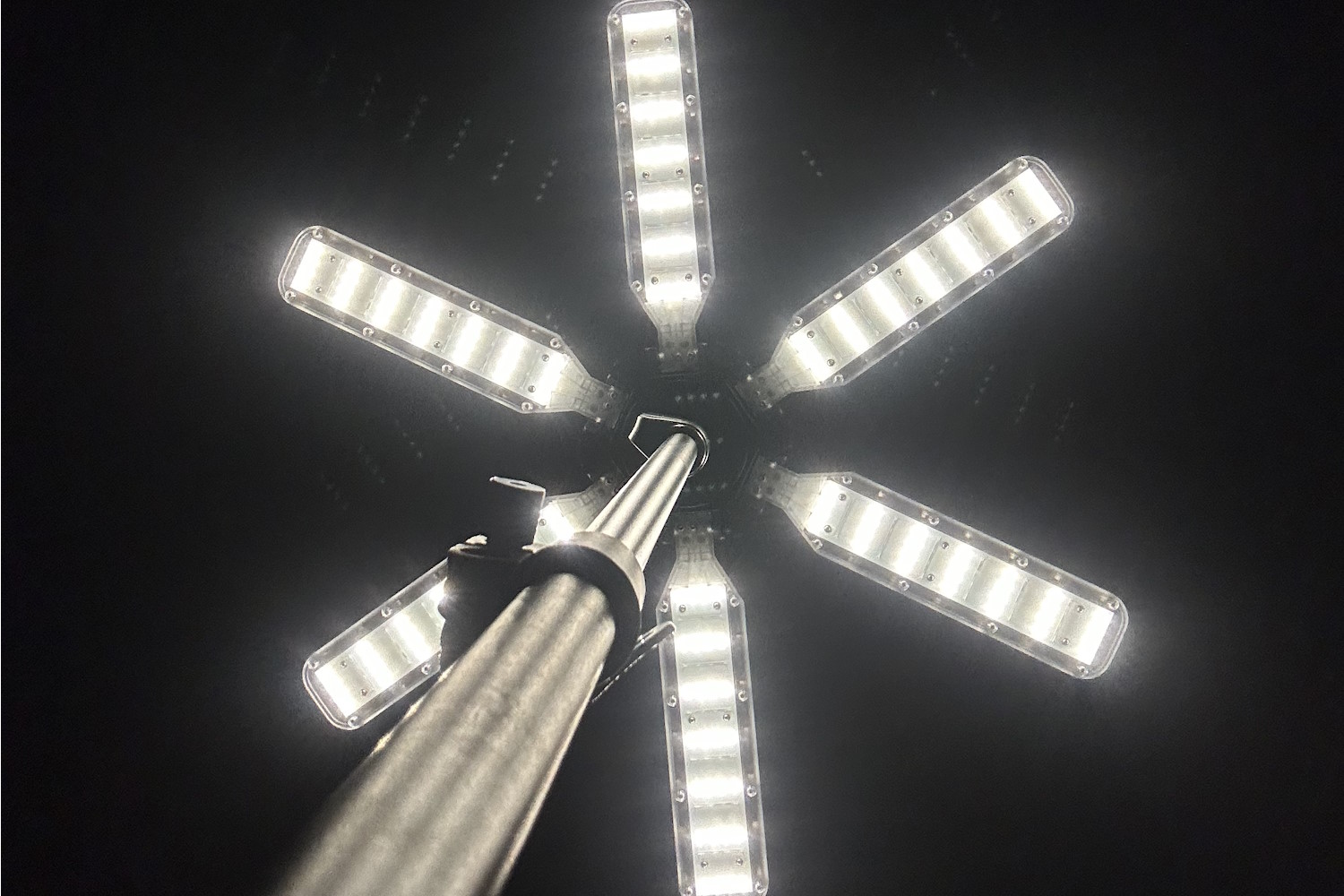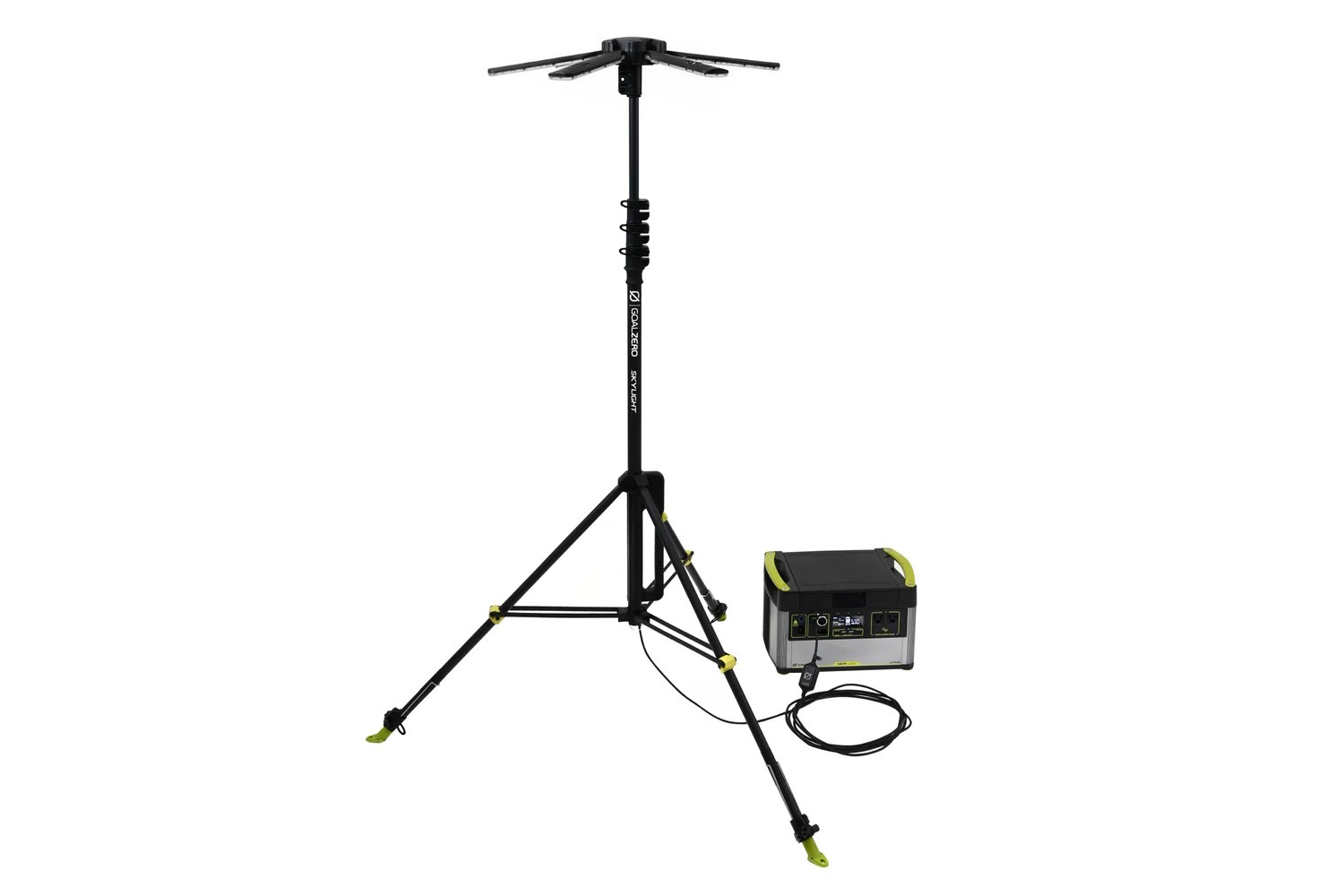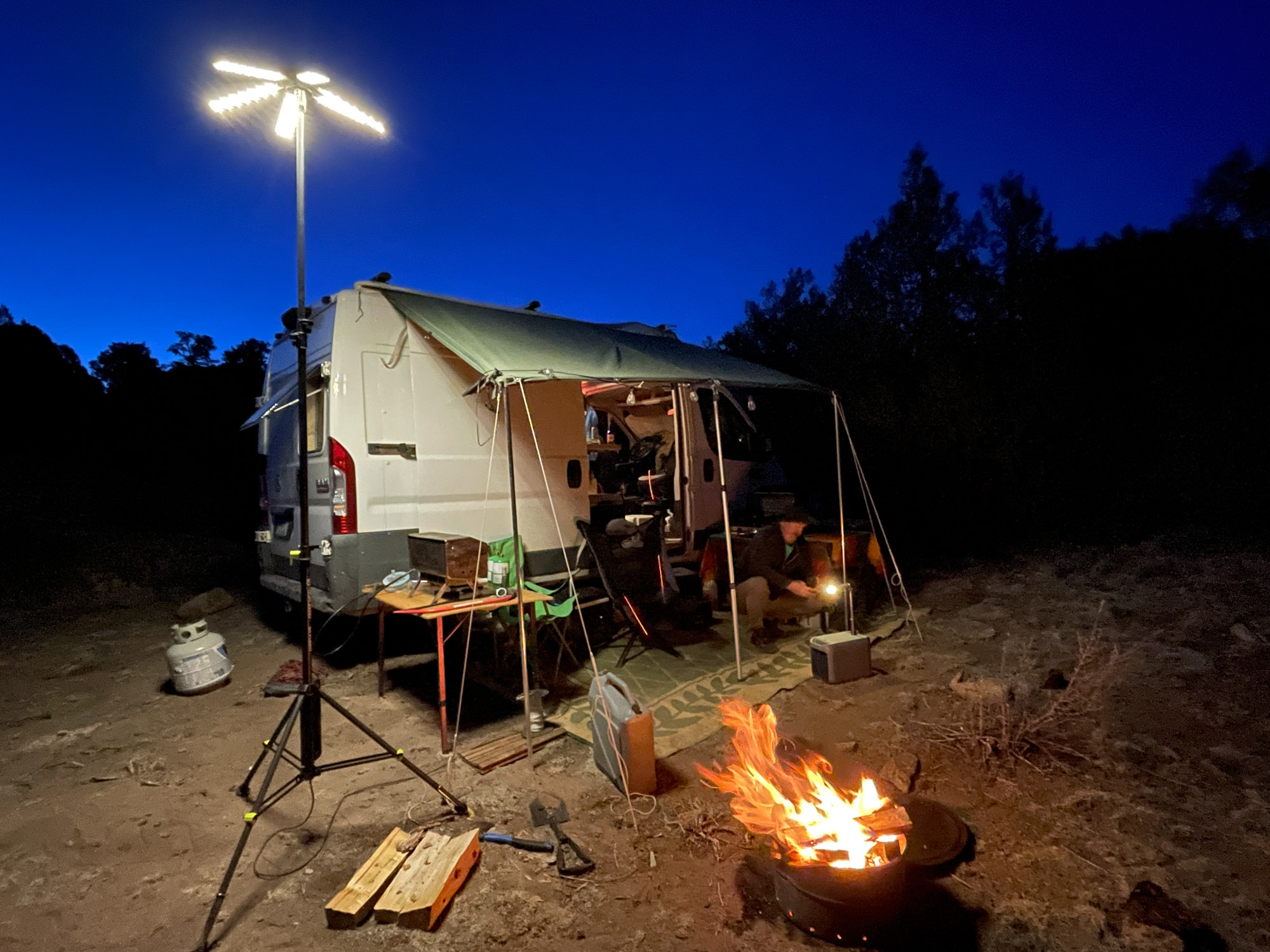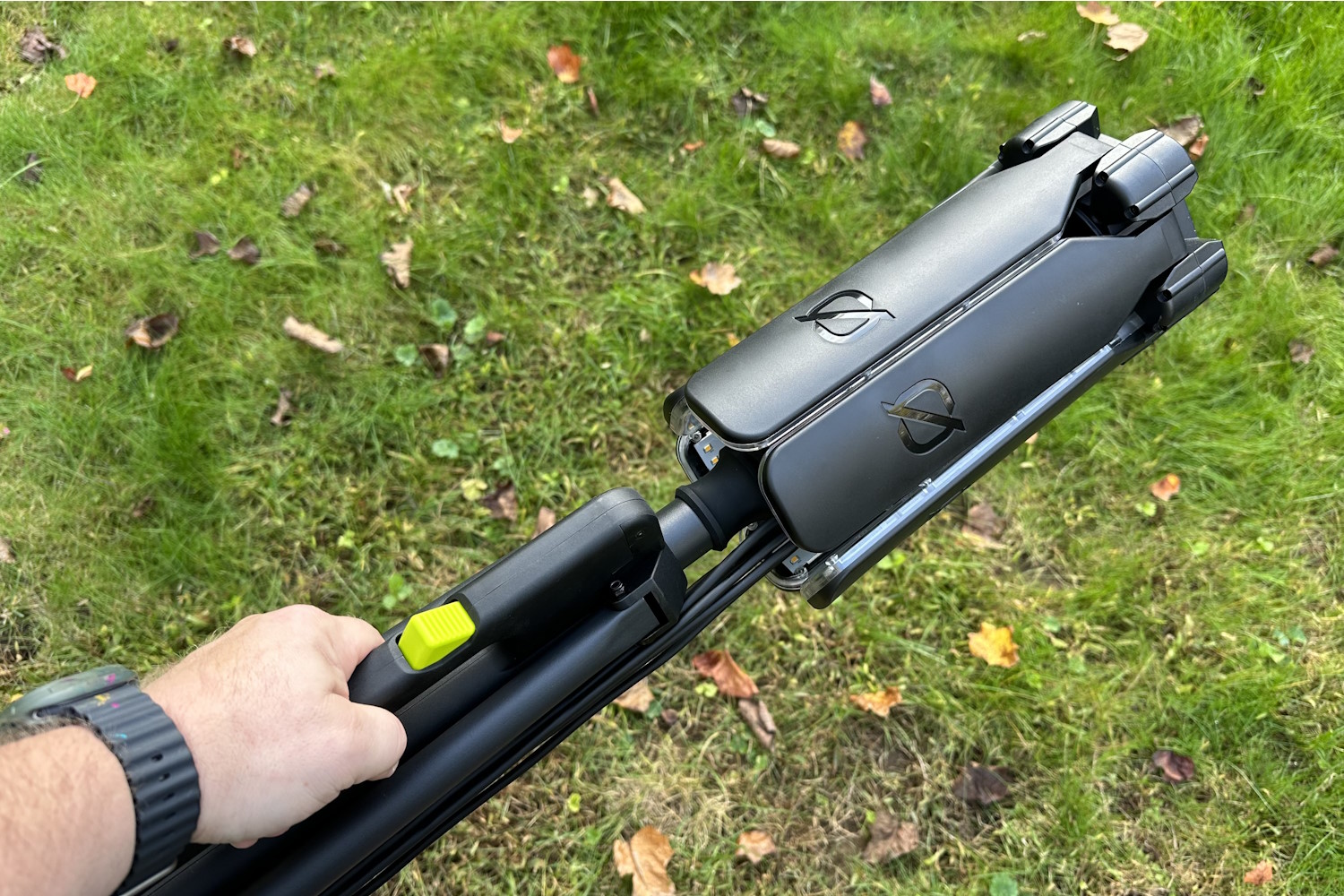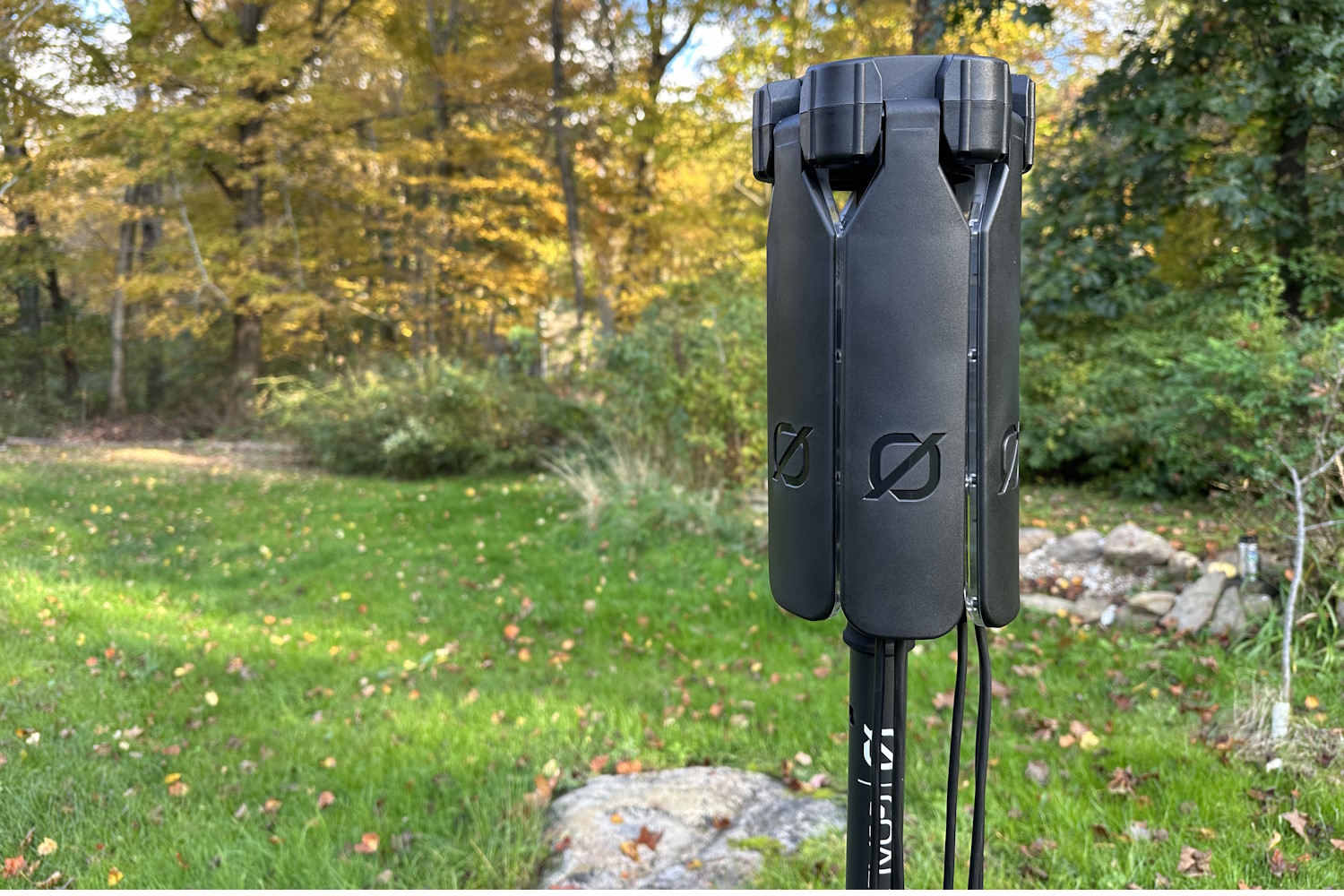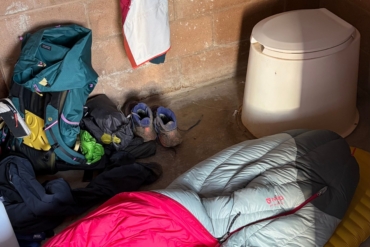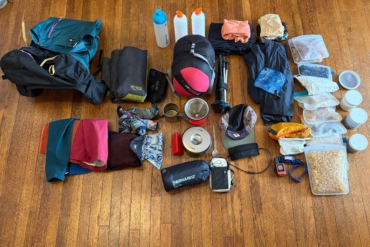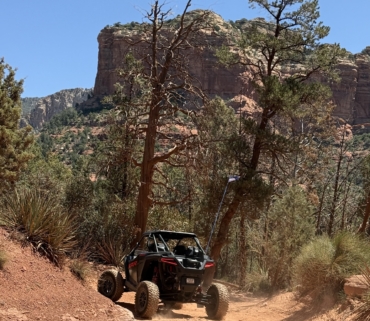Whether you’re in your backyard or 20 miles from nowhere, at some point you’re going to need light if you plan on keeping the party going. In those places where plugging your lights into an outlet isn’t an option, running your lights off disposable or rechargeable batteries can be wasteful and annoying. Additionally, the more lights you have around you in the outdoors in the warmer months, the more you’ll attract mosquitoes and other things that go bump in the night.
With its Skylight portable area light, Goal Zero eliminates any of the aforementioned hang-ups and many unmentioned. But even more, with this one light, which provides up to 6,000 lumens, you can illuminate up to 150 feet in every direction. This allows you to eliminate the need for multiple outdoor lights, as well as batteries, and cords. The Skylight is designed to light up your night, wherever you are.
If none of that has gotten your attention, I’ll throw in the fact that the Skylight takes less than 3 minutes to set up and take down — in any weather. Also, it can telescope up to 12 feet high, and each petal has 1,000 lumens. It can be aimed in its own direction, and it has an internal battery, which, as I’ll detail, comes in handy for those nights when you show up late or those mornings when you have to leave early.
I spent quite a few nights in the backyard. as well as 20 miles from nowhere, with the Skylight. Overall, I’m impressed. But, there’s much more to the story.
In short: If you’re looking for a long-lasting, durable, outdoor light that can light up your whole campsite all by itself, then the Goal Zero Skylight is right for you.
Looking for a camping lantern? See how the Goal Zero Skylight compares in our Buyer’s Guide to the Best Camping Lanterns.
-
Brightness
10.0
-
Battery Life
8.0
-
Features
7.0
-
Durability
8.0
- Lumens: 6,000 lm max; 350 lm low
- Power Source: 33 Wh Li-Ion rechargeable battery, solar panel
- Burn Time: 8 hrs. on low; 1 hr. on high
- Water Resistance: IPX4 water resistant
- Weight: 12 lbs., 1.9 oz.
- USB Port: N/A
Pros
- 150 feet of illumination in all directions with adjustable petals
- Impressive durability, including the case
- Incredible operating time
Cons
- Life of the internal battery isn't great
- Requires set-up each time
Goal Zero Skylight Review
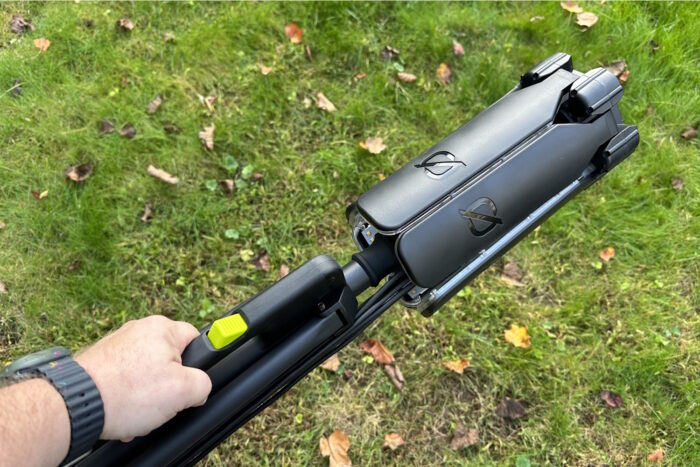
The Skylight is an exciting concept overall. I think the lighting and connectivity aspects of it were very familiar for Goal Zero to easily design and execute. However, creating something portable enough to be packed away and carried without being a burden — but could telescope up to 12 feet and be rigid enough so it wouldn’t just fall over — had to be a massive undertaking.
As someone who knows quite a bit about the Goal Zero brand, as well as what’s out there for other portable telescoping area lights, I feel like the Skylight is built better than the rest. I’ll go as far as saying that it exceeded my expectations.
Being able to take it out of the case and set it up in around 3 minutes is impressive.
I’m really digging the fact that the six petals adjust independently, which means you can really customize the lighting on your site, and possibly contain it to just your site. I also like how the telescoping legs can rotate and be staked down. This opens up the different types of terrain you can set it up on to near infinity.
One thing that the Skylight can’t do out of the box, but would add to its appeal, would be the ability to charge the internal battery directly from a solar panel. In reality, all it would take is a simple in-line adapter to get it to charge directly from one of Goal Zero’s Nomad, Boulder, or Ranger panels.
Goal Zero Skylight: Power & Operation
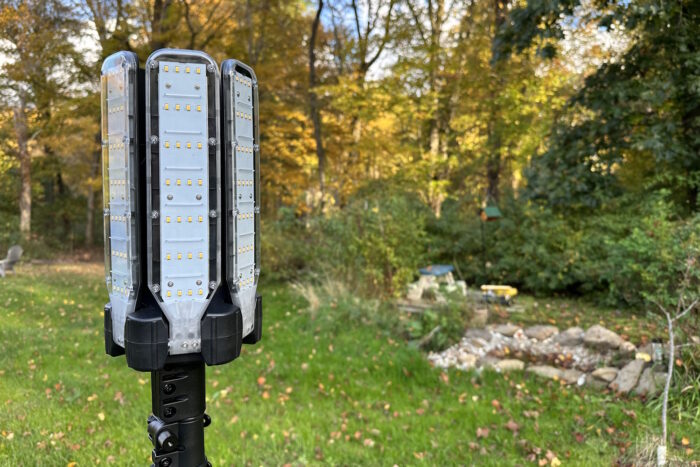
Brightness & Consumption
The Skylight has four brightness settings, each of which provides its maximum lumens.
- Low: 400 lumens, 4W of power
- Medium: 1,350 lumens, 12W of power
- High: 3,500 lumens, 34W of power
- Boost: 6,000 lumens, 67W of power
Skylight Operating Time
The Skylight is designed to be powered by its own internal, Li-ion NMC battery or by one of Goal Zero’s Yeti Power Stations. The bigger the station, the more hours you’ll get from the Skylight.
- Battery: Low – 8 hrs., Med – 2.5 hrs., High – 1 hr., Boost – N/A
- Yeti 200X*: Low – 50 hrs., Med – 15 hrs., High – 5 hrs., Boost – 1 hr.
- Yeti 500X: Low – 125 hrs., Med – 40 hrs., High – 15 hrs., Boost – 8 hrs.
- Yeti 1000X: Low – 250 hrs., Med – 80 hrs., High – 30 hrs., Boost – 15 hrs.
- Yeti 1500X: Low – 375 hrs., Med – 125 hrs., High – 45 hrs., Boost – 20 hrs.
*These numbers are tested estimates, as Goal Zero doesn’t specifically list its Yeti 200X as being compatible with the Skylight. I called Goal Zero early in the testing phase, and the brand confirmed that it would still work.
Goal Zero Skylight: What’s Included
- 1x Skylight unit
- 1x Rugged carrying case
- 1x 12V plug to female 6mm adapter
- 3x Ground stakes
What Will You Need, Additionally
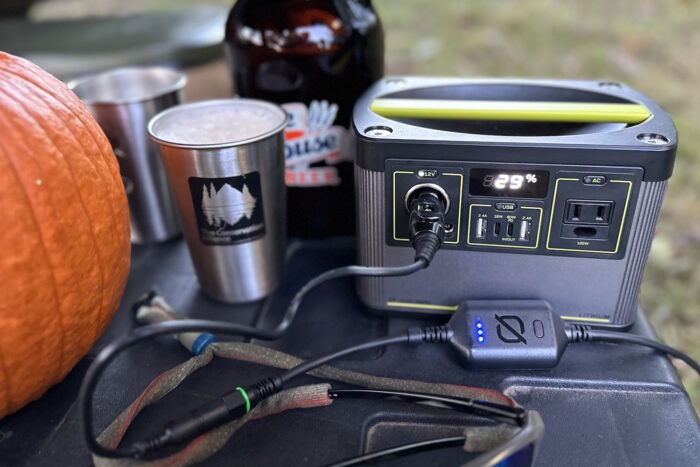
Outside of relying on its internal Li-Ion NMC battery, the Skylight requires an external power source to run. Where any one of Goal Zero’s Yeti Power Stations will get the job done, the Skylight does have a 12V cigarette lighter plug. This makes it compatible to any other brand of power station out there, as well as most vehicles.
I’m not recommending going rogue here. But, realistically, I don’t see any type of regulators or interfaces built into the Skylight that would prevent you from using another brand’s power station to power it. I also understand that these solar Power Stations and panels are an investment on their own, and I wouldn’t want to put a hard stop to someone trying to use what they already own to power it.
That said, if something did go wrong when you were using another brand’s power station, Goal Zero might rattle your cage a little bit if you called in to make a warranty claim.
I’m wicked tempted to tell you that a gas generator could work with the Skylight as well, but that seems like it defeats the purpose of this thing being built off of a solar platform by a solar company.
Skylight Design & Features
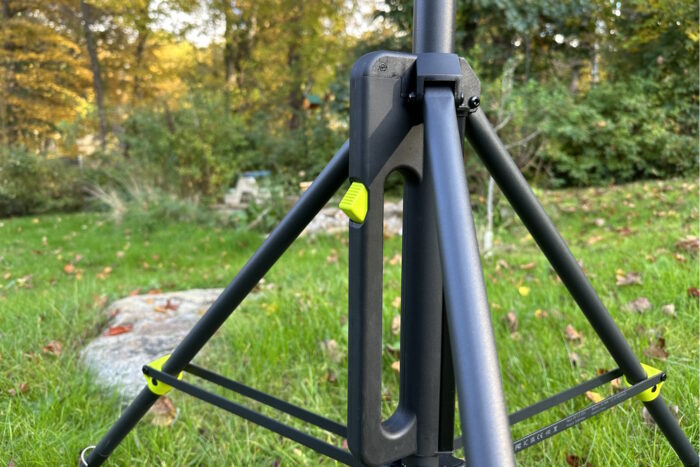
The Skylight is built to withstand a lot more than just sitting in the dirt and lighting up your site. It’s built to withstand bad weather and take a tumble. However, considering the reinforced, trigger-activated tripod that can be staked to the ground, I think it’s going to take a mighty wind to knock it over, or at least a drunk uncle.
The bottom tube, which is attached to the tripod, is 1.5 inches in diameter. That reduces to 0.88 inches by the time you get down to the top tube. For those of you who rely on Tiki torches around your campsites, that’s 0.12 inches larger than a Tiki torch pole. Or, as I like to call it — beefy.
The legs on the Skylight telescope and rotate so that you can adjust for all sorts of terrain vertically and horizontally. Each leg has a wire stake built into it, but the feet have an additional near-half-inch hole in them for bigger tent-style stakes. Every telescoping part of the Skylight has an adjustable clamp so you can adjust the resistance and grip to your liking.
The light itself looks like it belongs out in the desert at the sight of a UFO crash. It has six, adjustable, illumination petals that are 10.5 inches by 2.5 inches and contain 28 LED lights each. Anyone good at math, or with a calculator, can tell you that is 168 bulbs in total.
With each petal being able to adjust 180 degrees, and with four light settings, it would seem like you could infinitely adjust the lighting wherever you set the Skylight up. This will be a major benefit if you plan on using one of these units in a state park.
For connectivity, the cord on the Skylight is 16 feet long. When fully telescoped, there is 8 feet of cord remaining. Adding on the 12V cigarette adapter adds another 16 inches of length. Additionally, the controls and battery meter for the Skylight are on the cord itself.
The standard cord features a 6mm 12V male adapter, which means you can switch between that and the 12V adapter extension depending on what accessories you need to plug into your power station.
Stability in the Field
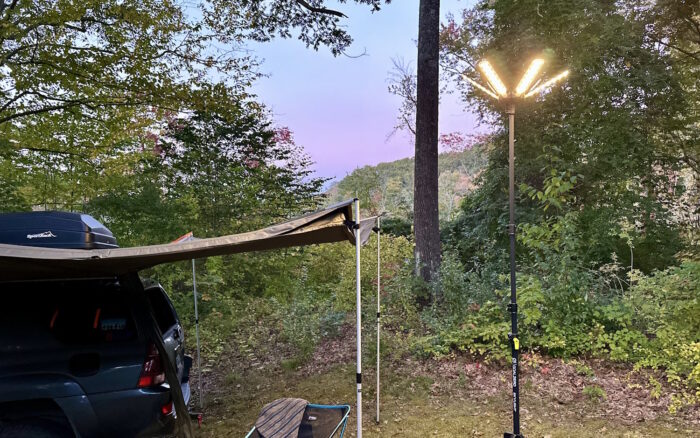
My two biggest takeaways are that the Skylight shines light wherever you need it. And because it can telescope up to 12 feet, you don’t need to worry about bugs coming after you. They’re up there in clouds buzzing around the light coming from the petals. It’s also incredibly stable, even fully extended.
I tested the stability out on the wooden floors of my house, the uneven, grassy terrain of my backyard, and out in the middle of nowhere where the ground was a fair mix of traprock, dirt, and plumes of grass. Having legs that telescope and rotate allows the Skylight to adapt to almost any terrain.
Even on sand, the one terrain I thought the Skylight was bound to topple over on, it didn’t. That being said, I would highly recommend getting longer stakes or consider weighing it down if the wind kicks up. But that’s not out of the ordinary for anything on the sand.
Now here’s the only thing I do have to bring up, and it’s not noticeable outdoors. But, fully extended, the Skylight has a bit of a lean. It doesn’t impact the stability, but on a level surface, there’s a noticeable cant. This can easily be eliminated by either adjusting the legs or knocking back the telescoping by about a foot or two.
All the Light
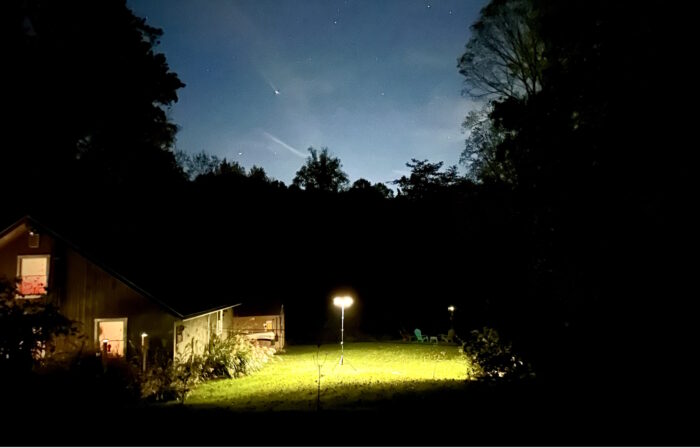
As far as the light, how powerful it is, and how long it lasts — you never need to use the Skylight on the Boost setting, at least not for long periods. That said, you don’t need to let the people on the International Space Station know you’re lighting up your spot, either. Be conservative and the Skylight, alone, will last you all night.
Even with just the Yeti 200X plugged into it, I used the medium setting nearly the whole time I was out, every time I was out. On that setting, I was able to get 2 days out of the power station and internal battery combined. That was with charging two iPhones and two iPads intermittently during that time.
I started to feel bad for my Nomad 100 solar panel, as there were times when I didn’t need to use it.
It’s important to mention that the light rating on the Skylight is “warm,” so it’s 3,250K. This is a nice difference from the majority of existing LED lights for the outdoors which are “cool,” or 6,000K, and a little too rich for most of our eyes.
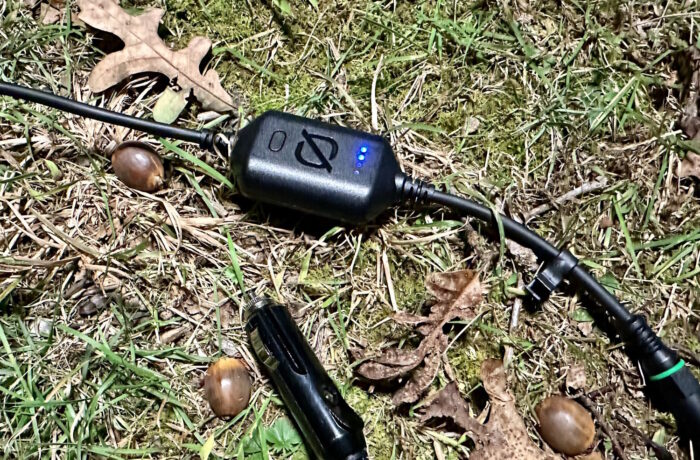
Goal Zero Skylight: Hidden Feature
No, there isn’t a bottle opener on the Skylight. Thank goodness, as almost every other piece of equipment that’s come out in the last 5-10 years has one. Including your flip-flops. But, since the Skylight has an internal Li-ion battery, it’s wicked simple to set up or break down camp in the dark.
One night, I went out to visit some friends but wasn’t staying overnight. Around 10 p.m., I broke down camp, which included the awning on the truck. I was able to leave the Skylight out, on, and unplugged while I organized everything back into its place in the 4Runner.
Usually, when you’re breaking down at night in the dark, you just throw your stuff back in your vehicle and deal with it the next day. It was nice having the area illuminated so I could make quick work of everything and not have to deal with it the next morning.
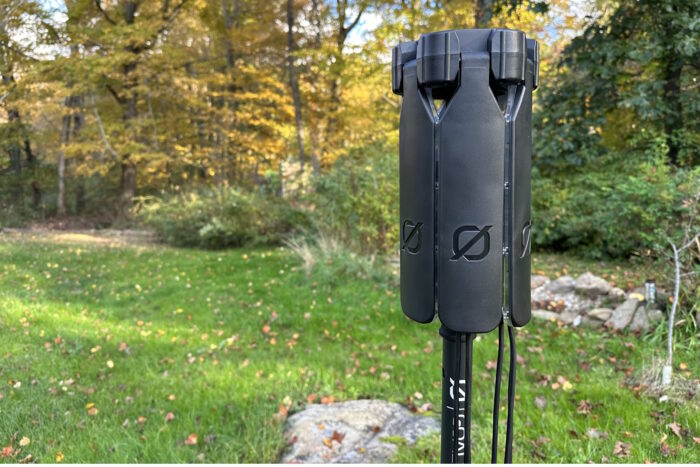
Just the Panel?
I’m a tinkerer by habit. Third-generation, if I’m being honest. I don’t see any way, off the shelf, where the Skylight could run just off solar panels. It would require a female adapted that went from 8mm to 6mm, which I’m sure could be cobbled together. I even talked with Goal Zero to confirm.
Overall, I don’t think it’s a big deal. But it is certainly a “nice to have.” Maybe if the brand ever makes a PRO version of the Skylight, that’ll be an option.
Goal Zero Skylight Review: Conclusions
Goal Zero’s Skylight is a long-lasting and effective solution for anyone who needs to light up the night. It’s great for the backyard, off roading, overlanding, camping, or even if the power goes out in the house and you need to light up a main area. With the right power station, it could last you up to 2 weeks without needing to be recharged.
It’s also great for tailgating, out at the docks, on the job site, or sitting outside an old, off-the-grid cabin in Vermont.
I think people who live the van life, in an RV, or overland will get the most out of the Skylight. Additionally, it is more than likely that they already have a power station from one brand or another. So, the $300 investment isn’t harrowing. But there isn’t one type of person who it’s made specifically for.
The Goal Zero Skylight is an innovation. It relies on solar power, which is easy for us and good for the planet. It’s easy to set up and take down, and it lights up everything you want it to. With a lot of bloat out there, even in the solar-powered accessories world, the Skylight is one of those products that becomes a necessity if you need portable light.
